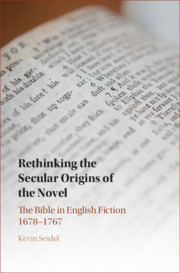Book contents
- Rethinking the Secular Origins of the Novel
- Rethinking the Secular Origins of the Novel
- Copyright page
- Contents
- Figures
- Tables
- Appendixes
- Acknowledgments
- Introduction
- Part I Rethinking the Secular at the Origins of the English Novel
- Part II Versions of Biblical Authority
- Part III Uses of Scripture for Fiction
- Chapter 6 Traveling Papers: Pilgrim’s Progress and the Book
- Chapter 7 Surprised by Providence: Robinson Crusoe as Defoe’s Theory of Fiction
- Chapter 8 Resilient to Narrative: Clarissa after Reading
- Chapter 9 Breaking Down Shame: Narrating Trauma and Repair in Tristram Shandy
- Conclusion
- Appendices
- Notes
- Works Cited
- Index
Chapter 7 - Surprised by Providence: Robinson Crusoe as Defoe’s Theory of Fiction
from Part III - Uses of Scripture for Fiction
Published online by Cambridge University Press: 16 March 2021
- Rethinking the Secular Origins of the Novel
- Rethinking the Secular Origins of the Novel
- Copyright page
- Contents
- Figures
- Tables
- Appendixes
- Acknowledgments
- Introduction
- Part I Rethinking the Secular at the Origins of the English Novel
- Part II Versions of Biblical Authority
- Part III Uses of Scripture for Fiction
- Chapter 6 Traveling Papers: Pilgrim’s Progress and the Book
- Chapter 7 Surprised by Providence: Robinson Crusoe as Defoe’s Theory of Fiction
- Chapter 8 Resilient to Narrative: Clarissa after Reading
- Chapter 9 Breaking Down Shame: Narrating Trauma and Repair in Tristram Shandy
- Conclusion
- Appendices
- Notes
- Works Cited
- Index
Summary
Chapter 7 discusses the kind of rhetorical irony that gathered in debates about the Bible in the early 1700s and then shows how Defoe puts that irony to use in the Bible scenes scattered through his three-book Crusoe novel (1719–1721), from Crusoe’s initial experiments with the Bible and tobacco leaves that he finds in a chest of scavenged goods, to the same Bible, which he later hands to Will Atkins to appoint him governor of the island, to the parables that Crusoe tells after his final “Vision of the Angelick World.” Those Bible scenes and parables help us track Defoe as he develops his theory of fiction, which he describes as narrative that creates the conditions for providence to make surprising, accidental connections between his text and its readers.
- Type
- Chapter
- Information
- Rethinking the Secular Origins of the NovelThe Bible in English Fiction 1678–1767, pp. 179 - 201Publisher: Cambridge University PressPrint publication year: 2021



